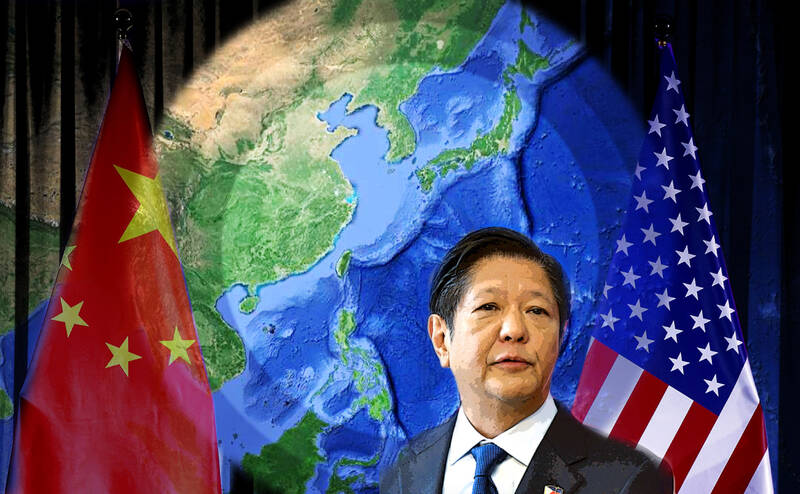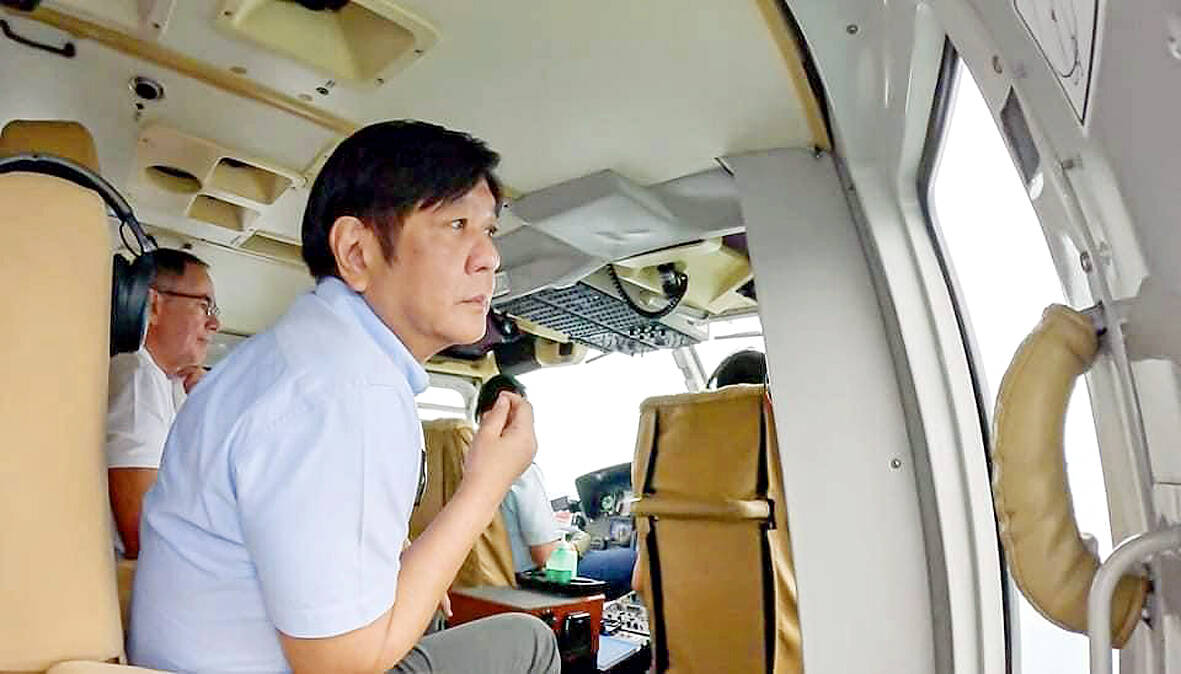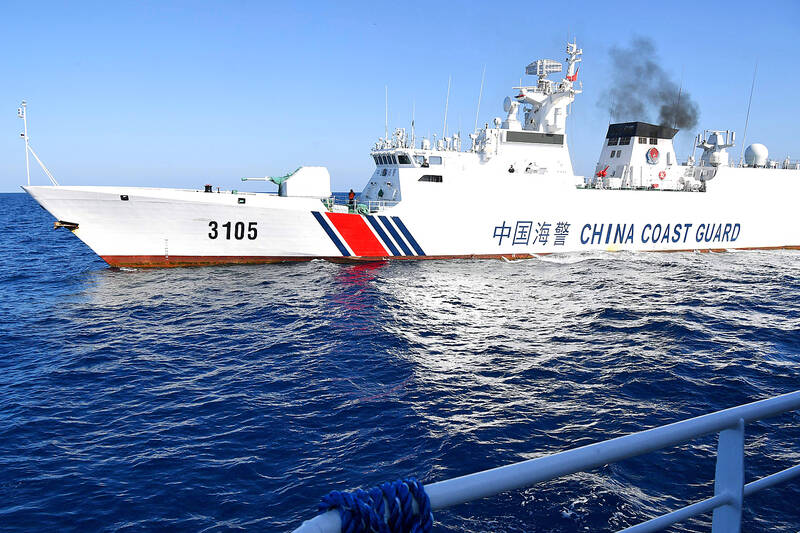In the mainstream view, the Philippines should be worried that a conflict over Taiwan between the superpowers will drag in Manila. President Ferdinand Marcos Jr observed in an interview in The Wall Street Journal last year, “I learned an African saying: When elephants fight, the only one that loses is the grass. We are the grass in this situation. We don’t want to get trampled.” Such sentiments are widespread.
Few seem to have imagined the opposite: that a gray zone incursion of People’s Republic of China (PRC) ships into the Philippines’ waters could trigger a conflict that drags in Taiwan. Fewer still have imagined that the PRC might choose that as an alternative to opening a PRC-US conflict by directly attacking Taiwan and Japan.

GRAPHIC: TT
WAR GAMES
Last month Robert Kitchen, a naval expert with the Royal Navy Strategic Studies Center, published a review of war games of the PRC Taiwan scenario. Kitchen observes that before 2020, war games tended to end in a victory for the US side. Then, between 2020 and 2022, the pendulum shifted to the PRC. “Finally,” he notes, “in the two games since Feb. 22, 2022, the immediate insights from the larger Russian invasion of Ukraine have tilted the outcomes towards the defender.”
The PRC games this too, and they are likely seeing the same trends the western war games are showing: high costs, immense destruction, global economic disaster, PRC defeat.

Photo: EPA
Recall that the PRC goal isn’t just interested in annexing Taiwan. It also demands Diaoyutai Islands (釣魚台) — called the Senkaku Islands in Japan — and Okinawa, has been eyeing the Batanes Islands in the Bashi Channel between Luzon and Taiwan, wants to solidify its control over the South China Sea, and then move on its next round of expansion. India? Korea? Regardless, we are not in for a single cataclysmic war, but likely several rounds of hegemonic warfare.
Americans tend to relate everything to World War II: sacrifices duly made, enemies duly defeated, problem duly solved. But even that war was the last in a series of hegemonic wars to settle Germany’s place in Europe, and Japan’s in Asia. In any case, the current position of the US is not that of the UK in the between-wars era, as Americans fondly imagine themselves to be. A much better historical analogy is the rise of an expansionist France in the 17th-18th century, with its wars of “reunion” over nearby states, a long wave of wars that finally ended at Waterloo. In that analogy, we are not the vigorous, rising English commercial kingdom, but Spain of Philip III.
The PRC is well aware of the numerous social, economic and industrial problems the US faces. The (pointless) expenditure of expensive Tomahawk missiles against the Houthis in the Red Sea mess has underscored the US Navy’s extensive ammunition problems: even a small operation expends missiles faster than the US can build them. US Representative Rob Wittman, chair of the House Armed Services Tactical Air and Land Forces panel, quoted in Politico in January, said that US problems are force-wide: “This is not just Tomahawks, but it’s also Standard Missiles. It’s also MK 48s, MK 54s, because there’s always been an issue, too, of inventory of torpedoes...”

Photo: AFP
A PRC attack on the Philippines would trigger Japanese and Taiwanese involvement, but probably not their military involvement, especially if the PRC was scrupulous about avoiding it. Moreover, unlike Taiwan, the US has a formal defense treaty with Manila: it would have to intervene. And it may have to do so without Japan’s impressive navy or Taiwan’s air and missile capabilities.
If Beijing uses its second-line forces with a leavening of first-line ships — over 1,200 hulls in the Coast Guard (under direct military control since 2013), including over 220 exceeding 500 tons displacement, never mind the thousands of vessels in the PRC’s seaborne militia, its fishing fleet and in its shadowy People’s Armed Forces Maritime Militia (PAFMM) — they will have to be killed. The fact that killing poorly armed ships will be easy does not mean it will be cheap, or successful. Ask the Ukrainians about stopping poorly trained Russian “meat assaults.”
Every commander who has ever played a war game well understands the concept of “soaking off” piles of cheap, weak units against the enemy’s expensive, more capable units, especially when they can be used to draw those expensive units into the range of airborne and land-based missiles that can kill them. That is how PRC commanders will view the coming war.
And when the US has expended thousands of munitions killing them, it will be short on the munitions it needs to conduct a successful defense of Taiwan. Its ships and crews, worn out by fighting and currently lacking in logistics capabilities for restocking missiles at sea (it is still testing systems for doing that), will have to return to ports weeks away for lengthy repairs and resupply.
A glance at the list of war games on Kitchen’s list shows that none of them considers an alternate start to a PRC-US war. All of them are Taiwan-centered and some don’t even include the Philippines. Our thinking on war with the PRC has become stale.
STRATEGIC THINKING
Other advantages of the Philippines may leap to PRC minds. The Philippines is heavily penetrated by PRC technology products, a testimony to the effectiveness of low-cost exports driven by PRC state policy, and the complete failure of western, especially US, firms and governments to respond to this. For example, while Apple is the top selling mobile phone brand in the Philippines, eight of the other top 10 mobile phone brands in the Philippines are from the PRC. The telecommunications infrastructure itself is also supplied in part by Huawei, though many local telecom firms of their own volition are working to diversify their technology sources. Astonishingly, the telecom towers on the Philippines’ military bases were built in 2019 by China Telecom, under contract with a local firm. As of last year, the Philippines had officers training in the PRC. It will not be difficult for PRC computer experts to spy on the Philippines’ handling of its defense, and to sabotage its infrastructure.
Moreover, the Philippines armed forces are not nearly as capable and powerful as Taiwan’s. Beijing knows this well, it has been taking Manila’s measure with its gray zone operations and patient, constant, wearing pressure on the Philippines.
Just last month PAFMM ships re-occupied the Philippines’ Sabina Shoal, lashed together to form rafts, according to satellite photos. The Philippines had ejected them in April of 2021, but they soon returned, and in larger numbers.
Beijing is not testing Manila. It does not need to.
It is testing the US.
Notes from Central Taiwan is a column written by long-term resident Michael Turton, who provides incisive commentary informed by three decades of living in and writing about his adoptive country. The views expressed here are his own.

April 14 to April 20 In March 1947, Sising Katadrepan urged the government to drop the “high mountain people” (高山族) designation for Indigenous Taiwanese and refer to them as “Taiwan people” (台灣族). He considered the term derogatory, arguing that it made them sound like animals. The Taiwan Provincial Government agreed to stop using the term, stating that Indigenous Taiwanese suffered all sorts of discrimination and oppression under the Japanese and were forced to live in the mountains as outsiders to society. Now, under the new regime, they would be seen as equals, thus they should be henceforth

Last week, the the National Immigration Agency (NIA) told the legislature that more than 10,000 naturalized Taiwanese citizens from the People’s Republic of China (PRC) risked having their citizenship revoked if they failed to provide proof that they had renounced their Chinese household registration within the next three months. Renunciation is required under the Act Governing Relations Between the People of the Taiwan Area and the Mainland Area (臺灣地區與大陸地區人民關係條例), as amended in 2004, though it was only a legal requirement after 2000. Prior to that, it had been only an administrative requirement since the Nationality Act (國籍法) was established in

Three big changes have transformed the landscape of Taiwan’s local patronage factions: Increasing Democratic Progressive Party (DPP) involvement, rising new factions and the Chinese Nationalist Party’s (KMT) significantly weakened control. GREEN FACTIONS It is said that “south of the Zhuoshui River (濁水溪), there is no blue-green divide,” meaning that from Yunlin County south there is no difference between KMT and DPP politicians. This is not always true, but there is more than a grain of truth to it. Traditionally, DPP factions are viewed as national entities, with their primary function to secure plum positions in the party and government. This is not unusual

US President Donald Trump’s bid to take back control of the Panama Canal has put his counterpart Jose Raul Mulino in a difficult position and revived fears in the Central American country that US military bases will return. After Trump vowed to reclaim the interoceanic waterway from Chinese influence, US Defense Secretary Pete Hegseth signed an agreement with the Mulino administration last week for the US to deploy troops in areas adjacent to the canal. For more than two decades, after handing over control of the strategically vital waterway to Panama in 1999 and dismantling the bases that protected it, Washington has